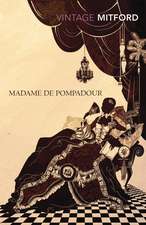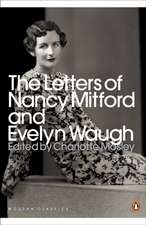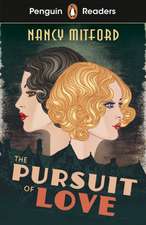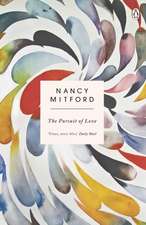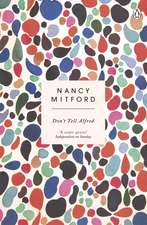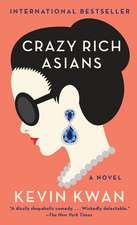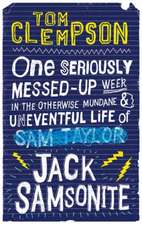The Blessing
Autor Nancy Mitford Introducere de Alex Kapranosen Limba Engleză Paperback – 25 noi 2015
It isn't just Nanny who finds it difficult in France when Grace and her young son Sigi are finally able to join her dashing aristocratic husband Charles-Edouard after the war. For Grace is out of her depth among the fashionably dressed and immaculately coiffured French women, and shocked by their relentless gossiping and bedhopping. When she discovers her husband's tendency to lust after every pretty girl he sees, it looks like trouble. And things get even more complicated when little Sigi steps in . . .
The Blessingis a hilarious tale of love, fidelity, and the English abroad, tailored as brilliantly as a New Look Dior suit.
'Entirely original, inimitable and irresistible'Spectator
'Deliciously funny' Evelyn Waugh
'Utter, utter bliss'Daily Mail
| Toate formatele și edițiile | Preț | Express |
|---|---|---|
| Paperback (2) | 52.54 lei 24-35 zile | +18.02 lei 7-11 zile |
| Penguin Books – 25 noi 2015 | 52.54 lei 24-35 zile | +18.02 lei 7-11 zile |
| Vintage Books USA – 31 iul 2010 | 109.13 lei 6-8 săpt. |
Preț: 52.54 lei
Preț vechi: 63.07 lei
-17% Nou
Puncte Express: 79
Preț estimativ în valută:
10.05€ • 10.50$ • 8.30£
10.05€ • 10.50$ • 8.30£
Carte disponibilă
Livrare economică 28 martie-08 aprilie
Livrare express 11-15 martie pentru 28.01 lei
Preluare comenzi: 021 569.72.76
Specificații
ISBN-13: 9780241974728
ISBN-10: 0241974720
Pagini: 256
Dimensiuni: 129 x 198 x 16 mm
Greutate: 0.18 kg
Editura: Penguin Books
Colecția Penguin
Locul publicării:London, United Kingdom
ISBN-10: 0241974720
Pagini: 256
Dimensiuni: 129 x 198 x 16 mm
Greutate: 0.18 kg
Editura: Penguin Books
Colecția Penguin
Locul publicării:London, United Kingdom
Notă biografică
Nancy
Mitford
(1904-1973)
was
born
in
London,
the
eldest
child
of
the
second
Baron
Redesdale.
She
had
written
four
novels,
includingWigs
on
the
Green(1935),
before
the
success
ofThe
Pursuit
of
Lovein
1945,
which
she
followed
withLove
in
a
Cold
Climate(1949),The
Blessing(1951)
andDon't
Tell
Alfred(1960).
She
also
wrote
four
works
of
biography.
Nancy
Mitford
was
awarded
the
CBE
in
1972.
Extras
1
‘The foreign gentleman seems to be in a terrible hurry, dear.’
And indeed the house, though quite large, what used to be called a family house, in Queen Anne’s Gate, was filled with sounds of impatience. Somebody was stamping about, moving furniture, throwing windows up and down, and clearing his throat exaggeratedly.
‘Ahem! Ahem!’
‘How long has he been here, Nanny?’
‘Nearly an hour I should think. He played the piano, very fast and loud, for a while, which seemed to keep him quiet. He’s only started this shindy since John went and told him you were in and would be down presently.’
‘You go, darling, and tell him he must wait while I change out of these trousers,’ said Grace, who was vigorously cleaning her neck with cotton wool. ‘Oh, the dirt. What I need is a bath.’
The drawing-room door was now flung open.
‘Do I see you or not?’ The voice was certainly foreign.
‘All right – very well. I’ll come down now, this minute.’
She looked at Nanny, laughing, and said, ‘He might go through the floor, like Rumpelstiltskin.’
But Nanny said, ‘Put on a dress dear, you can’t go down like that.’
‘Shall I come upstairs?’ said the voice.
‘No, don’t, here I am,’ and Grace ran down, still in her A.R.P.trousers.
The Frenchman, tall, dark and elegant, in French Air Force uniform, was on the drawing-room landing, both hands on the banister rail. He seemed about to uproot the delicate woodwork. When he saw Grace he said ‘Ah!’ as though her appearance caused him gratified surprise, then, ‘Is this a uniform? It’s not bad. Did you receive my note?’
‘Only now,’ said Grace. ‘I’ve been at the A.R.P. all day.’
They went into the drawing-room. ‘Your writing is very difficult. I was still puzzling over it when I heard all that noise – it was like the French Revolution. You must be a very impatient man.’
‘No. But I don’t like to be kept waiting, though this room has more compensations than most, I confess.’
‘I wouldn’t have kept you waiting if I’d known a little sooner – why didn’t you . . .’
He was no longer listening, he had turned to the pictures on the walls.
‘I do love this Olivier,’ he said. ‘You must give it to me.’
‘Except that it belongs to Papa.’
‘Ah yes, I suppose it does. Sir Conrad. He is very well known in the Middle East – I needn’t tell you, however. The Allingham Commission, ah! cunning Sir Conrad. He owes something to my country, after that.’ He turned from the picture to Grace looking at her rather as if she were a picture, and said, ‘Natoire, or Rosalba. You could be by either. Well, we shall see, and time will show.’
‘Papa loves France.’
‘I’m sure he does. The Englishmen who love France are always the worst.’
‘The worst?’
‘Each man kills the thing he loves, you know. Never mind.’
‘You’ve come from Cairo?’ she said. ‘I thought I read Cairo in your letter and something about Hughie? You saw him?’
‘The fiancé I saw.’
‘And you’ve come to give me news of him?’
‘Good news – that is to say no news. Why is this picture labeled Drouais?’
‘I suppose it is by Drouais,’ said Grace with perfect indifference.
Brought up among beautiful things, she took but small account of them.
‘Indeed? What makes you think so?’
‘Are you an art dealer?’
‘An art deal-ee.’
‘But you said you had news. Naturally I supposed it was the reason for your visit, to tell this news.’
‘Have you any milk chocolate?’
‘No, I’m sure we haven’t.’
‘Never mind.’
‘Would you like a cocktail – or a glass of sherry?’
‘Sherry, with delight.’
‘Did you enjoy Cairo? Hughie says it’s great fun.’
‘The museum is wonderful – but of course no pictures, while the millionaires, poor dears, have wonderful pictures, for which they’ve paid wonderful prices (from those ateliers where Renoirs and Van Goghs are painted on purpose for millionaires), but which hardly satisfy one’s cravings. Even their Corots are not always by Trouillebert. You see exactly how it is. So this afternoon I went to the National Gallery – shut. That is war. Now you will understand what an oasis I have found in Sir Conrad’s drawing-room, though I must have a word with him some time about this Drouais, so called.’
‘I’m afraid you won’t see many pictures in London now,’ said Grace. ‘Papa has sent all his best ones to the country, and most people have shut up their houses, you know.’
‘Never mind. I love London, even without pictures, and English women I love.’
‘Do you? Don’t we seem terribly dowdy?’
‘Of course. That’s what make you so amusing and mysterious. What can you possibly do, all day?’
‘Do?’
‘Yes. How do you fill those endless eons of time when Frenchwomen are having their hair washed, trying on hats, visiting the collections, discussing with the lingère – what is lingère in English?’
‘Underclothes-maker.’
‘Hours they spend with the underclothes-maker. What a funny word – are you sure? Anyhow, Frenchwomen always give one to understand that arranging themselves is full-time work. Now you English, like flowers in a basket, are not arranged, which is quite all right when the flowers are spring flowers.’ He gave her another long, approving look. ‘But how do you fill in the time? That is the great puzzle.’
‘I’m afraid,’ she said, laughing, ‘that we fill it in (not now, of course, but before the war) buying clothes and hats and having our hair washed. Perhaps the results were not quite the same, but I assure you that great efforts were made.’
‘Please don’t tell me. Do leave me in the dark, it makes you so much more interesting. Do let me go on believing that the hours drift by in a dream, that those blind blue eyes which see nothing, not even your father’s pictures, are turned inward upon some Anglo-Saxon fairyland of your own. Am I not right?’
He was quite right, though perhaps she hardly knew it herself.
‘The foreign gentleman seems to be in a terrible hurry, dear.’
And indeed the house, though quite large, what used to be called a family house, in Queen Anne’s Gate, was filled with sounds of impatience. Somebody was stamping about, moving furniture, throwing windows up and down, and clearing his throat exaggeratedly.
‘Ahem! Ahem!’
‘How long has he been here, Nanny?’
‘Nearly an hour I should think. He played the piano, very fast and loud, for a while, which seemed to keep him quiet. He’s only started this shindy since John went and told him you were in and would be down presently.’
‘You go, darling, and tell him he must wait while I change out of these trousers,’ said Grace, who was vigorously cleaning her neck with cotton wool. ‘Oh, the dirt. What I need is a bath.’
The drawing-room door was now flung open.
‘Do I see you or not?’ The voice was certainly foreign.
‘All right – very well. I’ll come down now, this minute.’
She looked at Nanny, laughing, and said, ‘He might go through the floor, like Rumpelstiltskin.’
But Nanny said, ‘Put on a dress dear, you can’t go down like that.’
‘Shall I come upstairs?’ said the voice.
‘No, don’t, here I am,’ and Grace ran down, still in her A.R.P.trousers.
The Frenchman, tall, dark and elegant, in French Air Force uniform, was on the drawing-room landing, both hands on the banister rail. He seemed about to uproot the delicate woodwork. When he saw Grace he said ‘Ah!’ as though her appearance caused him gratified surprise, then, ‘Is this a uniform? It’s not bad. Did you receive my note?’
‘Only now,’ said Grace. ‘I’ve been at the A.R.P. all day.’
They went into the drawing-room. ‘Your writing is very difficult. I was still puzzling over it when I heard all that noise – it was like the French Revolution. You must be a very impatient man.’
‘No. But I don’t like to be kept waiting, though this room has more compensations than most, I confess.’
‘I wouldn’t have kept you waiting if I’d known a little sooner – why didn’t you . . .’
He was no longer listening, he had turned to the pictures on the walls.
‘I do love this Olivier,’ he said. ‘You must give it to me.’
‘Except that it belongs to Papa.’
‘Ah yes, I suppose it does. Sir Conrad. He is very well known in the Middle East – I needn’t tell you, however. The Allingham Commission, ah! cunning Sir Conrad. He owes something to my country, after that.’ He turned from the picture to Grace looking at her rather as if she were a picture, and said, ‘Natoire, or Rosalba. You could be by either. Well, we shall see, and time will show.’
‘Papa loves France.’
‘I’m sure he does. The Englishmen who love France are always the worst.’
‘The worst?’
‘Each man kills the thing he loves, you know. Never mind.’
‘You’ve come from Cairo?’ she said. ‘I thought I read Cairo in your letter and something about Hughie? You saw him?’
‘The fiancé I saw.’
‘And you’ve come to give me news of him?’
‘Good news – that is to say no news. Why is this picture labeled Drouais?’
‘I suppose it is by Drouais,’ said Grace with perfect indifference.
Brought up among beautiful things, she took but small account of them.
‘Indeed? What makes you think so?’
‘Are you an art dealer?’
‘An art deal-ee.’
‘But you said you had news. Naturally I supposed it was the reason for your visit, to tell this news.’
‘Have you any milk chocolate?’
‘No, I’m sure we haven’t.’
‘Never mind.’
‘Would you like a cocktail – or a glass of sherry?’
‘Sherry, with delight.’
‘Did you enjoy Cairo? Hughie says it’s great fun.’
‘The museum is wonderful – but of course no pictures, while the millionaires, poor dears, have wonderful pictures, for which they’ve paid wonderful prices (from those ateliers where Renoirs and Van Goghs are painted on purpose for millionaires), but which hardly satisfy one’s cravings. Even their Corots are not always by Trouillebert. You see exactly how it is. So this afternoon I went to the National Gallery – shut. That is war. Now you will understand what an oasis I have found in Sir Conrad’s drawing-room, though I must have a word with him some time about this Drouais, so called.’
‘I’m afraid you won’t see many pictures in London now,’ said Grace. ‘Papa has sent all his best ones to the country, and most people have shut up their houses, you know.’
‘Never mind. I love London, even without pictures, and English women I love.’
‘Do you? Don’t we seem terribly dowdy?’
‘Of course. That’s what make you so amusing and mysterious. What can you possibly do, all day?’
‘Do?’
‘Yes. How do you fill those endless eons of time when Frenchwomen are having their hair washed, trying on hats, visiting the collections, discussing with the lingère – what is lingère in English?’
‘Underclothes-maker.’
‘Hours they spend with the underclothes-maker. What a funny word – are you sure? Anyhow, Frenchwomen always give one to understand that arranging themselves is full-time work. Now you English, like flowers in a basket, are not arranged, which is quite all right when the flowers are spring flowers.’ He gave her another long, approving look. ‘But how do you fill in the time? That is the great puzzle.’
‘I’m afraid,’ she said, laughing, ‘that we fill it in (not now, of course, but before the war) buying clothes and hats and having our hair washed. Perhaps the results were not quite the same, but I assure you that great efforts were made.’
‘Please don’t tell me. Do leave me in the dark, it makes you so much more interesting. Do let me go on believing that the hours drift by in a dream, that those blind blue eyes which see nothing, not even your father’s pictures, are turned inward upon some Anglo-Saxon fairyland of your own. Am I not right?’
He was quite right, though perhaps she hardly knew it herself.
Recenzii
“A refreshment to the mind and the spirit. . . . Cunningly constructed, artfully written, and divinely farcical.” —The New York Times Book Review
“Mitford tells her story with much wit, intelligence, and polish.” —The Times (London)
“Deliciously funny.” —Evelyn Waugh
“Mitford tells her story with much wit, intelligence, and polish.” —The Times (London)
“Deliciously funny.” —Evelyn Waugh
Descriere
Descriere de la o altă ediție sau format:
When Grace Allingham, a naive young Englishwoman, goes to live in France with her dashing husband she finds herself overwhelmed by her husband's French notion of marriage--which includes a permanent mistress--that sends her back to London with their son, Sigismond, in tow. While others urge the couple to reconcile, little Sigi applies all his juvenile cunning to keep his parents apart.
When Grace Allingham, a naive young Englishwoman, goes to live in France with her dashing husband she finds herself overwhelmed by her husband's French notion of marriage--which includes a permanent mistress--that sends her back to London with their son, Sigismond, in tow. While others urge the couple to reconcile, little Sigi applies all his juvenile cunning to keep his parents apart.

